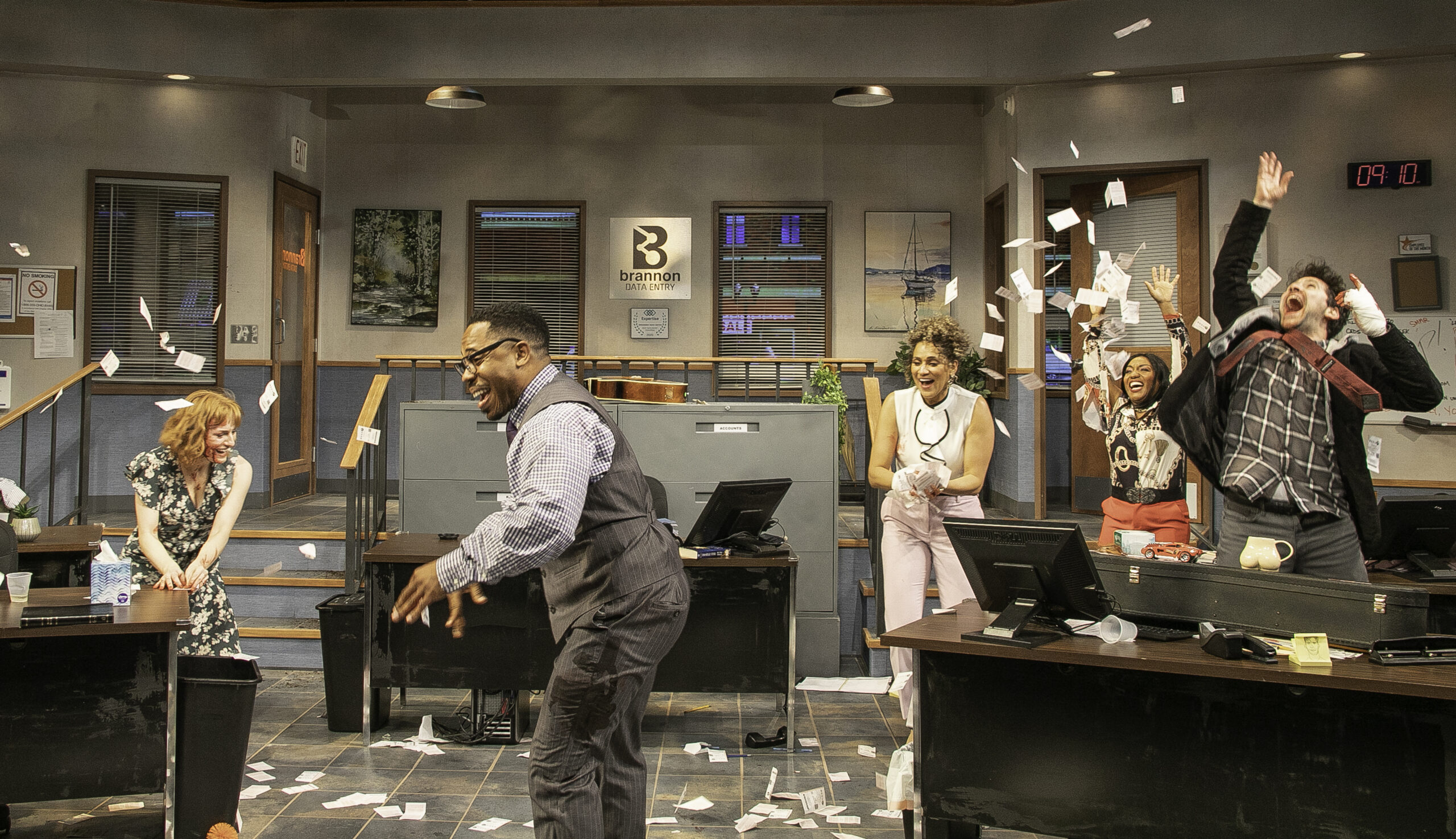
So you want to be a millionaire. Think it will solve all your problems and raise your social status? Think again, because in playwright Scooter Pietsch’s new play “Windfall,” when it comes to playing and winning the lottery, the reality of hitting it big may not be all it’s cracked up to be.
“Windfall,” which is directed by Jason Alexander (of “Seinfeld” fame) and currently enjoying its East Coast premiere as Bay Street Theater’s season opener, is a fun-filled kickoff that offers a good deal of food for thought. The comedy explores the many pitfalls of potential wealth when it collides with the hopes, fears and suspicions of five browbeaten workers who are trying their best to get out from under the thumb of a highly abusive boss.
Office pool lotteries and dreams of escape from day-to-day drudgery are familiar themes in the American landscape. But in “Windfall,” perhaps no one deserves to win the lotto more than the five defeated employees of Brannon Data Entry, a mundane numbers crunching firm headquartered in equally mundane Columbus, Ohio, who suffer under the constant abuse and manipulation of the company’s owner, Glenn Brannon (played brilliantly and sadistically by Spencer Garrett). The workers include: Hannah Higley (Abigail Isom), a 30-something woman who really needs to leave her husband; Galvan Kidd (Ro Boddie), an evangelical Christian whose devotion and hard work reaps few rewards; Chris Hart (Dylan S. Wallach), a young man whose few possessions include his late father’s guitar — which he can’t play — and a drinking problem, which he appears to have mastered; Kate Reardon (Badia Farha), the office manager who survives her day job by hitting the town every night; and Jacqueline Vanderbilt (Talia Thiesfield), a brand new hire with a fancy name who reeks of perfection and that none of the others trust.
The workers’ desperation to escape Brannon Data Entry is palpable and the company’s bullying chief executive is lucky he hasn’t yet been brought down by the #MeToo movement. Glenn Brannon belittles, cajoles and pits his employees against one another by insulting them and setting them up in fruitless timed data entry races on their computers. It’s all designed to keep morale low, suspicions high and the minions from becoming too chummy with one another.
But over years filled with data entry, thanks to after work social gatherings, the group has formed a close and cohesive bond that is evident whenever Glenn is out of ear shot. Though they believe winning the lottery will cement their friendship even further, odds are better that it will firmly insert the wedge between them that their vicious and vindictive boss cannot.
On its surface, “Windfall” is a hilarious character study in camaraderie, greed and workplace harassment with a good amount of slapstick humor thrown in (especially in act two). The five actors who portray the office staff gel in a comedic perfection as things increasingly get out of hand and the blood starts flowing (literally, but trust us, it’s funny). Despite the over-the-top humor, in his script Pietsch has managed to hit on some surprisingly complex sentiments about desperation and motives that can lead well-meaning people who truly deserve a break to abandon all reason for a shot at a better life.
But remember, just because someone truly deserves a break doesn’t necessarily mean he or she will get one and nice guys and gals frequently finish last.
The situational catalyst in “Windfall” that gets things moving in act one is Galvin, who claims to have a direct hotline to God and reports to work one morning with a vision of how the five of them will win that night’s lottery drawing, worth half a billion dollars. His non-believing coworkers are skeptical, but when Galvin shares the dramatic and inspirational details of a previous vision that played out in real life, they agree to join him by investing in the scheme.
A single five dollar investment, however, won’t do it this time around, and Galvin explains that numbers matter. In order to manifest his vision, Galvin is adamant that they must each invest exactly $911 into the lottery that evening and are instructed to gather at the office the following morning at exactly 9:11 a.m. to check every ticket until they find the winner. If you do the math, you’re talking 4,555 lottery tickets — that’s a lot of potential winners, but even more losers and in this script, there is a sea of losers to go around.
Given his own experience as a comedic actor, Alexander, who played the hapless George Constanza in “Seinfeld,” is the ideal director for “Windfall,” and he takes full advantage of the humor built into this script by ramping it up with over-the-top physical comedy as well. Like “Seinfeld,” there’s a certain parallel narrative in “Windfall” in that the play is a vehicle which employs the unremarkable routine of everyday life as its starting point. By adding the complexities of interpersonal relationships and situational missteps, minor conflicts become major battles in no time, and by act two, the entire stage has turned into an arena for a brawl — kudos to Mike Billings for a set that literally does double duty as an office and a place of horror.
It’s actually pretty damn funny and at some points, the audience will feel like they’re right in the middle of the action. Given that this production represents the first time Bay Street Theater has been able to present a play to a full house since 2019, why not take a chance at a good time? After all, what do you have to lose?
Scooter Pietsch’s “Windfall,” directed by Jason Alexander, runs through June 19 at Bay Street Theater in Sag Harbor. Scenic and lighting design is by Mike Billings, Christopher Vergara is the costume designer, Twi McCallum is the sound designer and Brian C. Staton is the video designer. To purchase tickets, visit baystreet.org or call the box office at 631-725-9500.